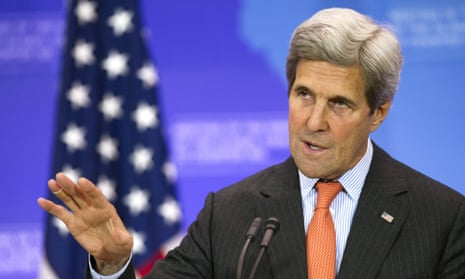The US secretary of state, John Kerry, will urge south-east Asian countries in meetings in Laos next week to explore diplomatic ways to ease tensions with China over the South China Sea, following an international court ruling denying China’s claims.
Kerry travels to Laos’s capital, Vientiane, on Monday for meetings of foreign ministers from the 10-member Association of South East Asia Nations (ASEAN), where tensions between China and several members, in particular the Philippines and Vietnam, is expected to dominate talks. Laos has close political and economic ties with China.
“The secretary will reinforce our hope that … the parties will now turn to constructively engaging in a effort to find diplomatic ways to peacefully interact in the South China Sea,” a senior US official told reporters ahead of the trip.
The annual ASEAN gathering will be the first since the 12 July ruling by the permanent court of arbitration in the Hague in a claim brought by the Philippines that China has no historic title over the waters of the South China Sea.
China has angrily rejected the verdict and pledged to pursue claims that conflict with those of several smaller neighbors. China has also blamed the US for stirring up trouble in the South China Sea, a vital waterway through which more than $5tn of trade moves annually.
Citing international rules, the US has conducted freedom-of-navigation patrols close to Chinese-held islands where China has been bolstering its military presence, which has exacerbated tensions.
The US official said it was important that ASEAN members “speak out and represent what common ground they found on issues”, including the South China Sea, as they negotiate wording for a joint statement at the end of the meeting.
The official added: “I’d put a little more value on the conversation that happens among the ministers themselves than I do in the often lengthy and torturous prose that is pulled together by the staff afterwards.”
Kerry will also discuss economics and trade, efforts to combat climate change, counter-terrorism and North Korea during his meetings.
The ASEAN meeting is one of the few occasions where the US secretary of state and senior North Korean officials are in the same room. The 27-nation ASEAN regional forum includes the US, North Korea, Russia, Singapore, Pakistan, India, Vietnam, Australia, China, Sri Lanka and Thailand.
Asked whether Kerry planned to meet his North Korean counterpart on the sidelines of the meeting, the US official said: “Other than the ordinary milling around and passing in the hall, there are no plans for a meeting between the secretary and the North Korean foreign minister.”
North Korea has pressed ahead with its nuclear and missile development despite increasing international pressure. Earlier this month, Washington imposed sanctions against the country’s leader, Kim Jong-un, for human rights abuses, a move Pyongyang called a “declaration of war”.
“The North Korean foreign minister will again hear not only from the secretary of state but also from others in the room that the world is not prepared to accept North Korea as a nuclear state,” the US official said.
The international community was prepared to pursue talks with Pyongyang “but not if North Korea continues to threaten and willfully flout its international obligations and its own commitments”, the official added.

Comments (…)
Sign in or create your Guardian account to join the discussion